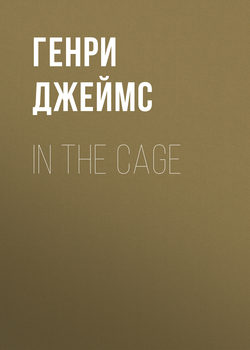In the Cage

Реклама. ООО «ЛитРес», ИНН: 7719571260.
Оглавление
Генри Джеймс. In the Cage
CHAPTER I
CHAPTER II
CHAPTER III
CHAPTER IV
CHAPTER V
CHAPTER VI
CHAPTER VII
CHAPTER VIII
CHAPTER IX
CHAPTER X
CHAPTER XI
CHAPTER XII
CHAPTER XIII
CHAPTER XIV
CHAPTER XV
CHAPTER XVI
CHAPTER XVII
CHAPTER XVIII
CHAPTER XIX
CHAPTER XX
CHAPTER XXI
CHAPTER XXII
CHAPTER XXIII
CHAPTER XXIV
CHAPTER XXV
CHAPTER XXVI
CHAPTER XXVII
Отрывок из книги
It was always rather quiet at Cocker’s while the contingent from Ladle’s and Thrupp’s and all the other great places were at luncheon, or, as the young men used vulgarly to say, while the animals were feeding. She had forty minutes in advance of this to go home for her own dinner; and when she came back and one of the young men took his turn there was often half an hour during which she could pull out a bit of work or a book—a book from the place where she borrowed novels, very greasy, in fine print and all about fine folks, at a ha’penny a day. This sacred pause was one of the numerous ways in which the establishment kept its finger on the pulse of fashion and fell into the rhythm of the larger life. It had something to do, one day, with the particular flare of importance of an arriving customer, a lady whose meals were apparently irregular, yet whom she was destined, she afterwards found, not to forget. The girl was blasée; nothing could belong more, as she perfectly knew, to the intense publicity of her profession; but she had a whimsical mind and wonderful nerves; she was subject, in short, to sudden flickers of antipathy and sympathy, red gleams in the grey, fitful needs to notice and to “care,” odd caprices of curiosity. She had a friend who had invented a new career for women—that of being in and out of people’s houses to look after the flowers. Mrs. Jordan had a manner of her own of sounding this allusion; “the flowers,” on her lips, were, in fantastic places, in happy homes, as usual as the coals or the daily papers. She took charge of them, at any rate, in all the rooms, at so much a month, and people were quickly finding out what it was to make over this strange burden of the pampered to the widow of a clergyman. The widow, on her side, dilating on the initiations thus opened up to her, had been splendid to her young friend, over the way she was made free of the greatest houses—the way, especially when she did the dinner-tables, set out so often for twenty, she felt that a single step more would transform her whole social position. On its being asked of her then if she circulated only in a sort of tropical solitude, with the upper servants for picturesque natives, and on her having to assent to this glance at her limitations, she had found a reply to the girl’s invidious question. “You’ve no imagination, my dear!”—that was because a door more than half open to the higher life couldn’t be called anything but a thin partition. Mrs. Jordan’s imagination quite did away with the thickness.
Our young lady had not taken up the charge, had dealt with it good-humouredly, just because she knew so well what to think of it. It was at once one of her most cherished complaints and most secret supports that people didn’t understand her, and it was accordingly a matter of indifference to her that Mrs. Jordan shouldn’t; even though Mrs. Jordan, handed down from their early twilight of gentility and also the victim of reverses, was the only member of her circle in whom she recognised an equal. She was perfectly aware that her imaginative life was the life in which she spent most of her time; and she would have been ready, had it been at all worth while, to contend that, since her outward occupation didn’t kill it, it must be strong indeed. Combinations of flowers and green-stuff, forsooth! What she could handle freely, she said to herself, was combinations of men and women. The only weakness in her faculty came from the positive abundance of her contact with the human herd; this was so constant, it had so the effect of cheapening her privilege, that there were long stretches in which inspiration, divination and interest quite dropped. The great thing was the flashes, the quick revivals, absolute accidents all, and neither to be counted on nor to be resisted. Some one had only sometimes to put in a penny for a stamp and the whole thing was upon her. She was so absurdly constructed that these were literally the moments that made up—made up for the long stiffness of sitting there in the stocks, made up for the cunning hostility of Mr. Buckton and the importunate sympathy of the counter-clerk, made up for the daily deadly flourishy letter from Mr. Mudge, made up even for the most haunting of her worries, the rage at moments of not knowing how her mother did “get it.”
.....
Her interlocutress was sturdy enough. “What do you call your ideas?”
Mrs. Jordan’s reply was fine. “If you were to see me some day with a thousand tulips you’d discover.”
.....